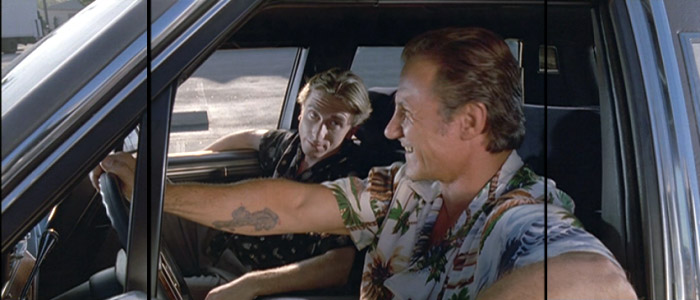| The film is now out on a multi-disc DVD, including a scene-specific commentary from several of the people who were involved in the film, including Tarantino. Actually, I'm pretty sure they could have fit the film and the special features on one DVD. The only justification for the second disk is to present a new full-screen version, for those of you who just have to see that 2.35:1 ultra widescreen image panned and scanned down to television size. I'm not sure why you would want this, but it is there, and it is done as well as can be expected, considering that it is a task nigh on to impossible, since it involves cutting an image by more than 40%. (See below. Black lines define the 4:3 version) | |||||
|
|
|||||
|
The most interesting feature on the new issue is the
collection of deleted scenes. It is especially fascinating, because if
those scenes were cut back into the film, it would be a very different
film. Depending on the exact sequence of the scenes, it would most
likely play out as a film about an undercover cop, not as a film about
some gangsters with a cop somewhere among them. There is a long scene
in which Tim Roth discusses the strategy of the robbery with his
superior officer. There is a very long scene in which Roth and his
superior discuss Mr White with a fellow officer, a female who has done
some significant research. Those two scenes aren't very good to begin
with, especially the one with the female officer, in which she tries
to be serious about her police work while the senior officer makes
some jokes that don't work. More important than the quality of the
individual scenes, however, is the fact that they would make Reservoir
Dogs a different film, maybe a good movie, but not the one so highly praised.
I think the film works as well as it does because of the gradual revelation of the identity of the cop to us, and the even more gradual revelation to each of the other characters in turn. This is one of the few movies I've seen where flashbacks are more than simply a cinema cliché; where it is absolutely necessary to keep the facts revealed in the existing sequence. If this story were told in chronological order, it would lose the biggest "hook" that maintains the tension. Furthermore, the audience's identification with Roth as a cop would spoil the "band of brothers" combat mystique. The final scene, in which Roth tells Keitel he's a cop, thus assuring his own death, doesn't work unless you can believe there has been a genuine bond formed between the two men, in which case it becomes a matter of macho battlefield honor. If you had a clear vision that Roth was a cop, and that his feelings of brotherhood with the others were a complete sham, then the scene would feel false. It only works if Roth is a warrior acknowledging an opposing warrior who fought with honor, not a fake. |
|||||
|
Would a cop really do such a thing? If you asked that question, you don't quite understand Tarantino. Reality is irrelevant here. That's like saying that Superman is a dumb movie because guys can't fly, or that Poker is a dumb game because there's no trump. You may not like the rules, but they are what they are. Reservoir Dogs is not a film about real people doing real things. It is a romanticized warrior's tale, and you have to evaluate it on its own terms, just as you have to evaluate Superman as a film about a flying guy. The characters are not meant to be real. They are created for our entertainment. They are super-villains, like Lex Luthor. Quentin Tarantino is not a former gangster trying to portray the gangster life, or the way the gangsters really talk. In all likelihood, he has met real gangsters, but doesn't even know it, just like the rest of us. He thought they were car dealers or amusement game distributors. This is a movie about movie characters, not a movie about people, and it is a movie about how young men view the denizens of the movie world, not how adults see them. People in these movies don't use reason and polite negotiation. They wave guns at each other and talk macho bullshit. They are 14 year old playground bullies wearing men's bodies. George Lucas once said that he made his movie for nine year olds. After they turn 12, Tarantino gets 'em. Is that bad? Hell, no. Not at all. Who said films had to be about life? Sometimes we watch films to escape from life. Tarantino entertains a helluva lot of people with his comical banter and his crazy characters, to such a degree that this movie is rated in the top 100 of all time at IMDb, despite the fact that it grossed less than $3 million when it debuted. |
||||
|
|||||

